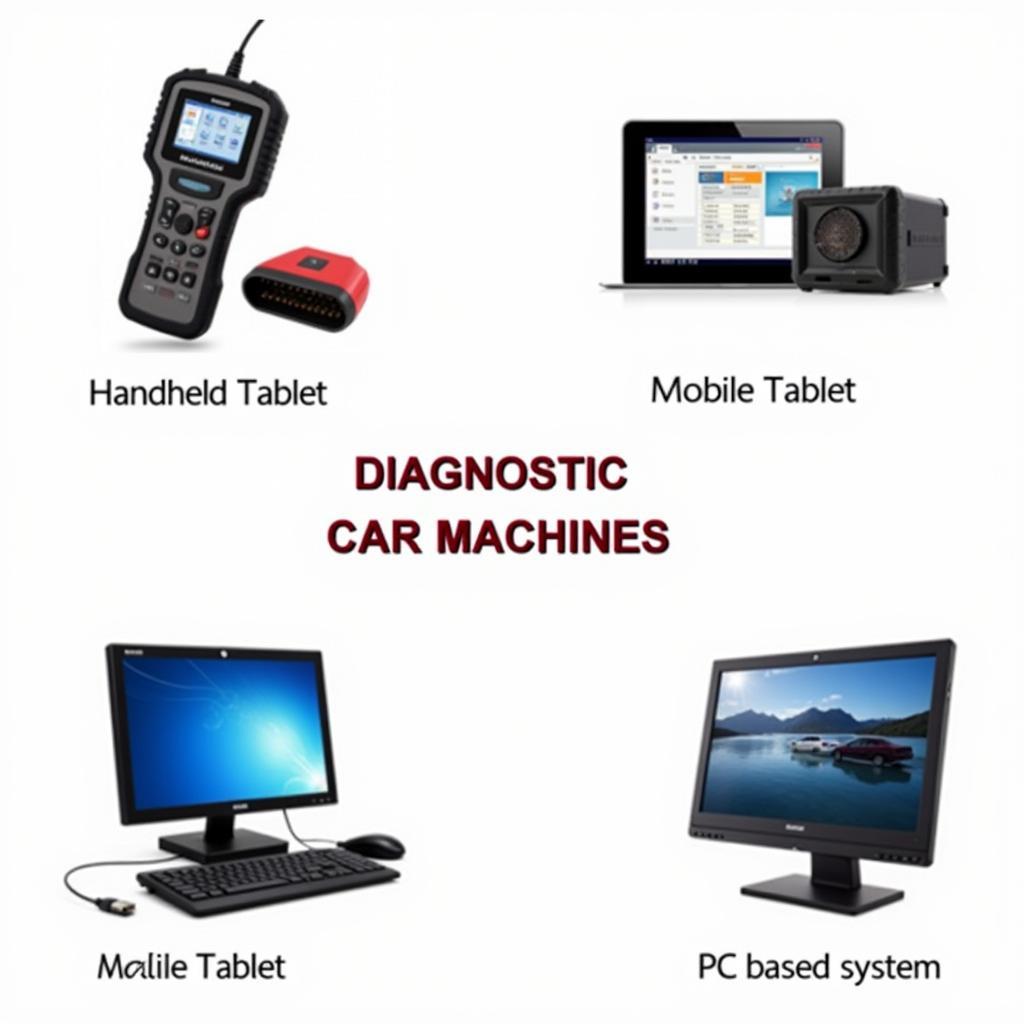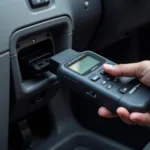A diagnostic car machine is an essential tool for any modern mechanic. It allows you to communicate with a car’s computer system, read and clear fault codes, and access live data streams. This information is crucial for diagnosing and repairing complex car problems quickly and efficiently.
Understanding the Importance of a Diagnostic Car Machine
Gone are the days of relying solely on mechanical expertise to troubleshoot car issues. Today’s vehicles are equipped with sophisticated electronic control units (ECUs) that manage everything from engine performance to safety features. A diagnostic car machine serves as the bridge between these complex systems and the mechanic, allowing them to:
- Retrieve Diagnostic Trouble Codes (DTCs): These codes act as a starting point for diagnosis, pinpointing potential problem areas within the vehicle’s systems.
- Access Live Data Streams: Monitor real-time data from various sensors, providing insights into the vehicle’s current operating status and identifying any anomalies.
- Perform Actuator Tests: Command specific components, such as solenoids or motors, to verify their functionality and pinpoint faulty parts.
- Program and Configure Modules: In some cases, a diagnostic car machine can be used to program new modules, update software, or customize vehicle settings.
Key Features to Consider When Choosing a Diagnostic Car Machine
Selecting the right diagnostic car machine depends on your specific needs and budget. Here are some key features to consider:
- Vehicle Coverage: Ensure the machine supports the makes and models you work on, including both domestic and import vehicles.
- System Coverage: Consider the range of systems the machine can diagnose, such as engine, transmission, ABS, airbags, and more.
- Software Features: Look for user-friendly software with intuitive navigation, clear data presentation, and helpful diagnostic resources.
- Update Options: Regular software updates are crucial for staying current with the latest vehicle models and technologies.
- Durability and Portability: Choose a machine built to withstand the demands of a workshop environment, especially if you require portability for on-the-go diagnostics.
diagnostic machine for cars near me
Types of Diagnostic Car Machines
The market offers a variety of diagnostic car machines, each catering to different user needs:
1. Handheld Scanners:
- Pros: Affordable, compact, and easy to use. Suitable for basic diagnostics and code reading.
- Cons: Limited functionality, may not support all vehicle systems or advanced functions.
2. Mobile Tablet Scanners:
- Pros: Portable, user-friendly interface, often wireless for added convenience. Offer a balance between affordability and functionality.
- Cons: May not be as powerful as PC-based systems, software updates can be costly.
3. PC-Based Systems:
- Pros: Most comprehensive functionality, extensive vehicle and system coverage, access to advanced diagnostic software and resources.
- Cons: Higher initial investment, require a dedicated computer, can have a steeper learning curve.
The Future of Car Diagnostics
The automotive industry is in a constant state of evolution, and diagnostic technology is no exception. Here are some emerging trends:
- Wireless Connectivity: Bluetooth and Wi-Fi enabled devices allow for seamless communication between the diagnostic machine, the vehicle, and online databases.
- Cloud-Based Diagnostics: Access to vast repositories of repair information, technical manuals, and diagnostic assistance directly from the cloud.
- Artificial Intelligence (AI): AI-powered diagnostic tools can analyze data patterns, predict potential failures, and offer proactive maintenance recommendations.
Conclusion
A diagnostic car machine is no longer a luxury but a necessity for modern automotive repair. Choosing the right machine empowers mechanics to efficiently diagnose and repair complex vehicle issues, keeping pace with the ever-evolving automotive landscape.
Need help finding the perfect diagnostic car machine for your needs? Contact us today! Our team of experts is here to answer your questions and guide you towards the best solution.
Frequently Asked Questions
1. What is the difference between OBD-I and OBD-II?
OBD-I refers to the first generation of onboard diagnostics, while OBD-II is the standardized system used in most vehicles manufactured after 1996.
2. Can I use a diagnostic car machine on my own car?
Yes, many DIY car enthusiasts use diagnostic car machines to troubleshoot basic problems and clear fault codes.
3. How often should I update my diagnostic car machine software?
It’s recommended to update your software at least twice a year to ensure compatibility with the latest vehicle models and features.
4. What is a bidirectional diagnostic scan tool?
A bidirectional scan tool can both read and send information to a car’s computer system, allowing for more comprehensive diagnostics and component testing.
5. Can a diagnostic car machine fix problems?
While a diagnostic car machine can identify problems, it cannot fix them directly. It serves as a powerful tool to pinpoint issues and guide the repair process.
Looking for more information on diagnostic car machines? Check out our other helpful articles:
- [diagnostic car machine used for sale in fife](https://diagfixpro.com/diagnostic-car-machine-used for-sale-in-fife/)
- diagnostic machine for car
- star diagnostic machine how to connect to car
- car fault diagnostic machine
Need expert advice on diagnostic car machines? We’re here to help!
Contact us:
- WhatsApp: +1(641)206-8880
- Email: [email protected]
Our team is available 24/7 to assist you with your car diagnostic needs.


